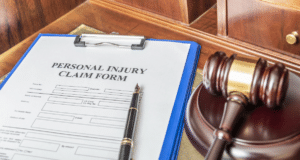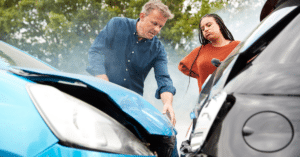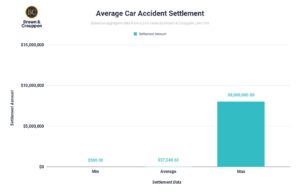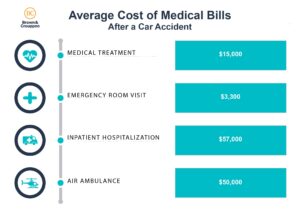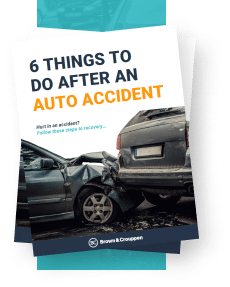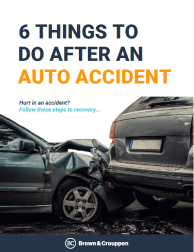

Use our legal checklist to learn what to do after an accident and understand key legal considerations for recovering financial compensation.
10 Common Signs of PTSD From a Car Accident
1. Flashbacks of the accident
If you find yourself repeatedly revisiting the accident in your thoughts, exploring ways to prevent it, or simply going over the details repeatedly, it could be a symptom. However, if you experience flashbacks that make you feel as if you’re reliving the accident, complete with a sense of being back at the scene, it’s likely indicative of PTSD. These flashbacks may be triggered by external factors like smells or sounds, or they may be solely prompted by internal stimuli.
Avoiding things or avoiding talking about the accident
Avoidance is a prevalent characteristic of this psychiatric disorder, which might be unexpected given its contrast with reliving the crash. If the mere thought of the accident evokes intense distress, or if you consistently steer clear of discussing it with loved ones and trusted individuals, it suggests that the impact of the accident runs deep within you.
3. Trouble sleeping
Difficulty sleeping could indicate PTSD following an auto accident, but it might also be linked to pain resulting from injuries sustained in the incident. It’s crucial to distinguish the cause of this symptom. If you’re experiencing nightmares that disrupt your sleep or hinder deep sleep, avoiding bedtime due to fear of nightmares, or oversleeping to postpone facing the day’s realities, it could be connected to your mental well-being rather than solely physical discomfort.
4. Trouble concentrating
If your ability to concentrate has diminished compared to pre-accident levels, or if you consistently experience a sense of distraction or brain fog, it could be indicative of PTSD. This is attributed to the impact of the disorder on the amygdala and prefrontal cortex of your brain. PTSD can heighten the sensitivity of the amygdala, responsible for threat detection, while simultaneously reducing the activity of the prefrontal cortex, responsible for regulating decisions and emotions. As a result, heightened anxiety and decreased focus on tasks, household chores, relationships, and activities that once brought enjoyment may be observed due to the abnormal functioning of these brain areas.
5. Avoiding driving or being passenger
Similar to refraining from discussing or contemplating the accident, avoiding entering a vehicle, the same vehicle involved in the accident, or even avoiding being the passenger in a car can also indicate MVA-related PTSD. Going out of your way to take detours and avoid the collision scene, even if it significantly prolongs your journey to reach your destination, qualifies as a form of avoidance behavior.
6. Atypical reactions
The body’s startle response, typically a reaction to fear, can become heightened in individuals with post-traumatic stress disorder following an auto accident. If you find yourself easily startled, more so than usual, it could be an indicator of PTSD.
7. Heightened feelings of irritability or anger & aggressiveness
This symptom stands out as one of the most prevalent indicators of PTSD. If you experience this disorder after an accident, your body might be consistently in a state of fight or flight. This could manifest as a persistent sense of being on edge, physical tension, prolonged periods of intense anger, or heightened irritability triggered by situations that wouldn’t typically provoke such reactions. You may notice yourself snapping at your children, spouse, friends, or coworkers, and feeling agitated even in the absence of a clear reason.
8. Mood swings
Mood swings are a frequently overlooked indication of PTSD following an auto accident, as they may appear unrelated to the crash. If you find yourself cycling through emotional highs and lows in quick succession—experiencing feelings of hopelessness, guilt, or intrusive thoughts one moment and then feeling completely happy and carefree the next—it could be a warning sign that something is amiss. This symptom might be noticed by your family and friends, or you may manage to conceal it. However, if your mood seems disconnected from your usual circumstances, it may suggest the presence of PTSD.
9. Self-isolation
Coping with PTSD can be immensely challenging. At times, withdrawing from friends and family may appear to be the simplest way to handle it, whether due to the fear that others won’t comprehend your experience or the desire not to burden them. Isolation often surfaces as a typical symptom of PTSD; if you find yourself spending increasing amounts of time alone, it could indicate the presence of this disorder. However, isolation doesn’t contribute to healing; instead, it amplifies the feelings of hopelessness you may be grappling with. Seeking support from others and consulting medical professionals is a crucial step towards recovery!
10. Feelings of depression
PTSD doesn’t solely manifest in anxiety responses; it can also give rise to depression, encompassing feelings of negativity, numbness, worthlessness, and challenges in participating in activities you once enjoyed. In severe cases, it may even lead to thoughts of self-harm or suicide. Help and hope are available. Reach out by calling 988, the suicide hotline, to speak with someone about your experiences, or contact your medical provider to explore the assistance they can offer.
How to Deal with Symptoms of PTSD after an Accident
1. Talk to your doctor
If you experience any of these symptoms, you should contact your doctor. There are many avenues to get you the help you need; your physician can help you find the right treatment for you.
2. Learn about trauma & PTSD
Learning more about your condition could shed light on some of the things you may be experiencing. Being informed can be reassuring by understanding that you’re not alone; many people are dealing with PTSD just like you are.
Educational resources also provide more tips on healthy coping mechanisms and helps connect you with those who may be in a similar situation. Start by searching “PTSD” or “How to cope with PTSD” and you will find an abundance of information.
3. Join a PTSD Support Group
Many people find joining a support group helps. Having a safe place to discuss your experience with others can be very therapeutic. Support groups bring people together who are suffering from similar experiences and encourage them to share feelings, coping techniques, and treatments that have been beneficial for them.
Support groups may be offered by a nonprofit advocacy organization, clinic, hospital or community organization. They also may be independent of any organization and run entirely by group members. Most support groups are free or have minimal fees to join. If you’re concerned about costs, contact your legal team.
Spend time with positive influences
Reaching out to your own support system also can be very valuable to your recovery. PTSD after a car accident can make you feel less connected with those around you, so it is important to stay in contact with people during such a difficult time.
Connect with a friend or family member who cares about you; you don’t have to talk about the accident unless you’re ready. Just knowing you have someone there to listen can really help you start to feel like yourself again.
Remember it’s a journey. Everyone recovers at their own pace. Your experience is uniquely yours.
Take Action if You Experience PTSD After an Auto Accident
Experiencing PTSD after an auto accident can have adverse effects on your health, relationships, career, and opportunities, but seeking treatment can make a significant difference! The encouraging news is that, although recovery may take time, interventions like psychotherapy and medications can prove highly effective. By adhering to a professional treatment plan, you stand a good chance of achieving recovery. Your doctor will dedicate time to accurately diagnose your condition, ensuring that any other contributing factors are addressed concurrently. Treatment options may include cognitive therapy, exposure therapy, EMDR (eye movement desensitization and reprocessing), as well as medications like Zoloft or Paxil (antidepressants), anti-anxiety medications, Prazosin/Minipress, and other methods tailored to the severity of your symptoms.
Determine Your Eligibility to Recover Compensation with the Help of a Law Firm
Even with comprehensive health insurance, the expenses associated with psychotherapy, doctor visits, and medications may not be fully covered, contributing to added financial stress amid your struggles with PTSD. If the auto accident, the catalyst for pain and suffering (such as PTSD), resulted from someone else’s negligence, personal injury lawyers at Brown & Crouppen Law Firm are here to assist you in seeking justice. We will hold the responsible party accountable and strive to secure maximum monetary damages from their auto insurance company or yours, ensuring you don’t bear any out-of-pocket costs for injuries or resulting mental health issues.
Our law firm empathizes with your situation, having represented numerous accident victims dealing with PTSD. If you lack a current medical provider, we can connect you with quality care, and we are committed to ensuring you receive fair compensation. Importantly, our legal fees are contingent on winning your case, so you won’t incur any charges until we succeed. Call today to arrange a free consultation and gather more information.
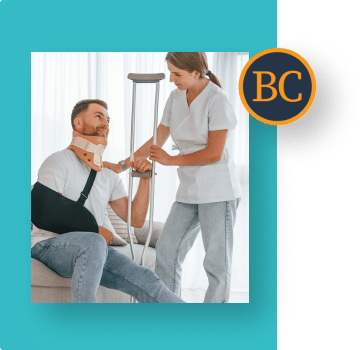
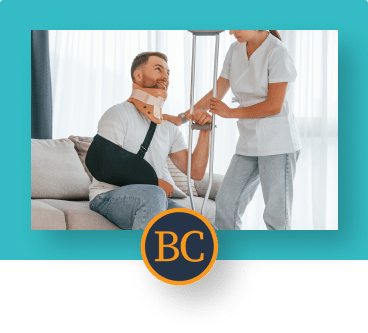
Were you injured in an accident due to someone else’s negligence? Get legal help from the most effective injury law firm in the Midwest.
Frequently Asked Questions
How long does PTSD last after a car accident?
PTSD symptoms generally go away within 1 week to 3 months after an accident. Other symptoms may last for years–especially if not properly treated. If you believe that you have PTSD or are experiencing symptoms, see your doctor or primary care physician to determine next steps.
What does PTSD look like?
Indicators of PTSD can encompass flashbacks, nightmares, intense anxiety, and persistent, uncontrollable thoughts about the incident. While individuals who undergo traumatic events might initially struggle to adapt and cope, the majority typically experience improvement over time through proper self-care.
Can I recover compensation if I have PTSD from a car accident?
If you’ve suffered PTSD from a car accident, you may be eligible to recover compensation. The average PTSD settlement is worth between $10,000 and $100,000. Find out if you have a case by requesting a free online case evaluation from the legal team at Brown & Crouppen Law Firm. We’ve helped recover over $1 billion for our clients.

